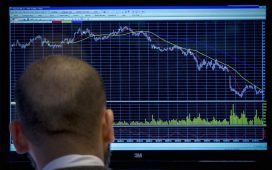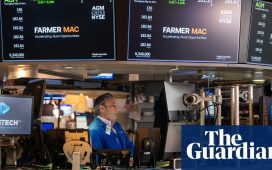UK avoids stagnation with 0.2% growth in Q2
Newsflash: The UK economy has posted modest growth in the second quarter of this year, defy fears of stagnation.
UK GDP expanded by 0.2% in April-June, the Office for National Statistics reports, beating forecasts of no growth in the quarter. This follows growth of 0.1% in January-March.
In June, the economy also fared better than expected — with growth of 0.5%.
That follows the GDP fall of 0.1% in May, and growth of 0.2% in April.
The ONS explains:
In output terms, the services sector grew by 0.1% on the quarter, driven by increases in information and communication, accommodation and food service activities, and human health and social work activities; elsewhere, the production sector grew by 0.7%, with 1.6% growth in manufacturing.
In expenditure terms, there was strong growth in household consumption and government consumption, which was partially offset by a fall in international trade flows in the second quarter.
Key events
Rachel Reeves MP, Labour’s Shadow Chancellor, says growth in the UK economy “is still on the floor”, adding:
“13 years of economic mismanagement under the Conservatives has left Britain worse off and trapped in a low growth, high tax cycle.
“Labour’s plan for the economy will boost growth, increase wages and bring down bills so working people are better off.”
Suren Thiru, economics director at ICAEW, says the rebound in quarterly UK GDP in the second quarter the year was “underwhelming”
Today’s growth report highlights “the worrying fragility in our economy” as inflation, higher interest rates and waning customer demand weigh on activity, Thiru says, adding:
“While GDP bounced back strongly in June, this reflects more the reversal of the squeeze on output from the extra bank holiday in May, rather than a meaningful improvement in our growth trajectory.
Looking ahead, the EY ITEM Club of economic forecasters predict the economy will show “a bit more momentum” in the third quarter of this year.
Martin Beck, chief economic advisor to the EY ITEM Club, explains:
A return to a normal complement of working days will mechanically boost growth, energy bills fell in July for the first time in almost three years and, relatedly, inflation is coming down, easing financial strains on households and businesses.
But Beck also points out that the growth of 0.2% reported this morning in Q2 is still “modest”.
He explains:
“The fact that GDP rose in June wasn’t much of a surprise, given the number of working days returned to normal following the extra public holiday in May. However, growth of 0.5% month-on-month was much better than the consensus expectation of 0.2% and more than reversed May’s 0.1% fall in output.
An apparent working-day boost was particularly noticeable in industry and construction, which both rebounded from falls in output in May to record growth of 1.8% and 1.6% respectively. Services output also increased, helped by particular strength in the information and communication and retail sectors, but the rise here was a more muted 0.2%, with the impact of strikes in the health sector holding back activity.
“Reassuringly, the economy also grew a bit faster than expected in Q2 as a whole, despite the obstacles presented by the extra public holiday, industrial action in some sectors, rising interest rates and still-high inflation. But growth of 0.2% quarter-on-quarter was modest and left the economy only 0.4% larger than a year earlier and still 0.2% below its pre-pandemic size in Q4 2019. So, the story of broad flatlining in activity since mid-2022 didn’t change a great deal.
The UK economy is “pedalling hard to achieve minimal economic growth”, warns economist Andrew Sentance, a former member of the Bank of England’s monetary policy committee which sets interest rates.
Latest GDP figures show that the U.K. economy is pedalling hard to achieve minimal economic growth. Money GDP is 7.1 percent up on a year ago, but high inflation has crowded out most of that nominal growth. Real #GDP is just 0.4 percent up on a year ago.
— Andrew Sentance (@asentance) August 11, 2023
International comparisons
The UK lagged behind the US and France in the second quarter of this year, but beat Germany and Italy.
Not all G7 countries have reported Q2 GDP data yet, but we do know that:
-
US: grew by 0.6% in the second quarter of 2023
-
France: grew by 0.5%
-
Germany: stagnation, with 0% growth
-
Italy: contracted by 0.3%
The eurozone economy grew faster than the UK, with eurozone GDP expanding by 0.3% in April-June. But the wider European Union stagnated in the second quarter.
Treasury minister John Glen argues that today’s growth figures show there was “a lot of resilience” in the UK economy.
Speaking on Radio 4’s Today programme, Glen defends the UK’s 0.2% growth in April-June.
If you look at what’s happening in Germany where it’s flat, and Italy where it’s minus 0.3, it’s not easy across the whole of the world economy at the moment.
The combined effects of what happened with Russia and Ukraine, supply chains, the legacy of Covid, that can’t be fixed in one lever from the Treasury.
The TUC union have accused Jeremy Hunt of being “asleep at the wheel” over the state of the UK economy.
Despite the pick-up in growth in Q2, and June, TUC general secretary Paul Nowak warns that jobs are at risk, and pay and conditions are being held down.
Nowak says:
“The chancellor must stop hiding behind the Bank of England and take responsibility for the serious economic failure unfolding on his watch.
“Around the world, other countries are delivering far higher investment and stronger protections for workers – while asking those with the broadest shoulders to pay a fairer share. There is no reason why the UK can’t follow suit.
“After 13 years of Conservative government, the high pay high productivity economy we all desperately need remains out of reach.
“Instead of sitting back and hoping for the best, the government needs to take responsibility and act.”
GDP growth of 0.2% in April-June means little to the 7.3 million low-income families who right now are going without essentials like heating, eating and adequate clothing, warns the Joseph Rowntre Foundation’s chief economist, Alfie Stirling.
Stirling explains:
Even those who aren’t facing immediate hardship are being squeezed from all sides. As interest rates continue to rise, the already eye watering cost of rent, food and energy is being compounded by the rising cost of credit cards, overdrafts, and mortgages.
“For too many people, and too many places, the economy simply isn’t working. There are too few good jobs with rising real pay, too few people have the resources to take risks and try something new, and there is too little investment in the things we all need, both now and for the future.”
Resolution: weakest growth in 65 years outside of a recession.
Although UK GDP was stronger than expected in the April-June quarter, over the past 18 months growth has been the weakest for 65 years outside of a recession, says the Resolution Foundation.
So while the economy is not in recession, “the reality” is that it continues to stall, they say.
High inflation and rapid increases in interest rates meaning that this period will feel like a recession in all but name to many, Resolution warns.
James Smith, research director at the Resolution Foundation, says:
“The good news is that the economy grew by 0.2% in Q2, stronger than the flat growth many had expected. This is a continuation of the UK’s relative resilience as we continue to dodge the technical recession experienced elsewhere in the face of the ongoing cost of living crisis.
“But the big picture is that the UK economy has expanded by just 0.4% since the start of 2022 – the weakest growth in 65 years outside of a full-blown recession.
“With the economy continuing to stall, we are far from out of the cost of living crisis woods yet. Such weak growth will feel like a recession to many as families struggle with the ever-rising cost of essentials and higher mortgage repayments.”
.@ONS GDP out this morning for Q2 shows UK economy continuing its resilience in the face of the cost of living crisis, and exceeding expectations for flat growth, by expanding 0.2% on the quarter. But big picture remains one of weak growth over past 18 months. Thread to follow… pic.twitter.com/7NOQKc51r1
— JamesSmithRF (@JamesSmithRF) August 11, 2023
[updated at 8.30am]
Treasury minister John Glen has argued it is “very difficult” to achieve higher levels of growth when “you are dealing with inflation pressures”.
Speaking to Sky News this morning, Glen said:
“I think what it shows is there’s a lot of resilience in the UK economy. We saw a record upgrade from the IMF (International Monetary Fund) of 0.7% higher for the UK economy this year. That’s welcome news. When I started in office nine-and-a-half months ago, recession was predicted.
But of course, you know, I would like that figure to be higher, but we are in the middle of the pack with respect to our peers in the G7.
Germany’s is actually flat, Italy’s minus 0.3%. So, we’ve got a lot of work to do, but also in the context of the inflation pressures we see in the economy at the moment, it’s obviously a delicate balancing act because we want to deal with that inflation, which is a massive impact for business confidence and for households as we know, and obviously it’s very difficult to achieve higher levels of growth when you’re dealing with inflation pressures.”
Asked about the Prime Minister’s pledge to grow the economy by the end of the year, the Chief Secretary to the Treasury said:
“We had the highest growth last year in the G7 and we are predicted in 2025 to get back up to that level.
“But you won’t expect me to commentate on the outcome of something that will take all year: we are at half-time.”
Glen was also quizzed about the revelation last night that Conservative MP Theresa Villiers held £70,000 in Shell shares while environment secretary.
Glen pointed out that Villiers has apologised, adding:
“It was an oversight on her part and she will correct it and make sure it doesn’t happen again.”
Anna Jones – Theresa Villiers(Tory MP) owned £70k worth of shares in Shell when she was environment secretary, that wasn’t declared for 5 years… what do you make of that?
John Glen – “It was an oversight on her part & she’ll make sure it doesn’t happen again.”#KayBurley pic.twitter.com/3ml5oBQkJt
— Haggis_UK 🇬🇧 🇪🇺 (@Haggis_UK) August 11, 2023
On a quarterly basis, the UK economy has yet to recover its level at the end of 2019, before the Covid-19 pandemic.
The level of quarterly GDP in Quarter 2 2023 is now 0.2% below its Covid-19 level set in Q4 2019, the ONS says.
That means the UK is “the only large advanced economy yet to regain its pre-COVID late-2019 level,” points out Reuters.
Big picture remains one of the UK lagging its peers:
GDP Q2 2023 vs Q4 2019
🇬🇧 -0.2%
🇩🇪 +0.2%
🇫🇷 +1.7%
🇮🇹 +2.2%
🇺🇸 +6.2%🇯🇵🇨🇦 yet to report Q2 data (but were nowhere near negative territory in Q1)
— Andy Bruce (@BruceReuters) August 11, 2023
Rising household expenditure keeps economy away from recession
The Great British consumer is proving remarkably resilient and is helping the economy avoid falling into recession, for now at least.
That’s the verdict from Ed Monk, associate director for Personal Investing at Fidelity International:
Growth in the second quarter of 0.2% was slightly above expectations, thanks to household expenditure that jumped between April and June – no mean feat on the face of the cost-of-living crisis we’ve seen.
“The tight labour market helped to support consumer spending with wages rising strongly, albeit below the rate of inflation. Government support though the Energy Price Guarantee and an inflation-matching rise in the State Pension has also softened the blow for households, and it may also be possible that excess saving during the pandemic has allowed spending to be maintained.
“The UK economic glass is either half-full or half empty, depending on your point of view, Monk adds:
For the optimists, the Britain has avoided recession while wage growth and the labour market have been resilient. For the pessimists, growth is still weak with UK GDP below its level from before the pandemic and lagging other major economies.
“Conditions are likely to get worse from here as higher interest rates take full effect, wages slow and the jobs market weakens. These things may be necessary in the fight against persistent inflation but it means there’s more uncertainty to come for households.”
UK’s Hunt: Plan to fight inflation taking effect
Chancellor of the Exchequer Jeremy Hunt has welcomed the news that the UK economy grew by 0.2% in April-June, saying:
“The actions we’re taking to fight inflation are starting to take effect, which means we’re laying the strong foundations needed to grow the economy.
“The Bank of England are now forecasting that we will avoid recession, and if we stick to our plan to help people into work and boost business investment, the IMF (International Monetary Fund) have said over the longer-term we will grow faster than Germany, France and Italy.”
Sterling strengthens after GDP report beats forecasts
The pound has strengthened, jumping almost half a cent to $1.272 against the US dollar.
June’s stronger-than-expected growth feels like “the first positive surprise in a long run of economic plot twists”, says Joseph Calnan, corporate FX dealing manager at Moneycorp:
Calnan explains:
However, both GDP and inflation are still off where they need to be, with the Bank of England and government policymakers clearly struggling to deliver on their respective remits.
“The thornier question is what this will mean for interest rates. What the BoE has been looking for in its relentless campaign of back-to-back interest rate hikes is a meaningful slowdown in the economy, and this doesn’t hit that brief.
“Despite the backdrop of spiralling wage growth and a hot labour market; it’s possible the 25 bps rate rise forecast at the next MPC meeting will remain. But, as the past few months have shown us, you can never be sure which way the next set of economic indicators will go.”











